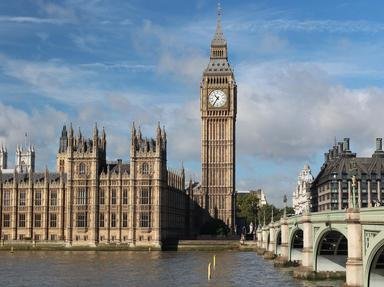Quiz Answer Key and Fun Facts
1. William Pitt the Younger was, not surprisingly, the son of William Pitt the Elder. What title was Pitt the Elder awarded in 1766?
2. Pitt the Younger was Pitt the Elder's second son and so did not inherit his title or much money on his father's death. Before entering politics, what profession did he pursue to earn some money?
3. Pitt the Younger was obsessed with politics from a young age, naturally enough for the son of a Prime Minister. At what age did he enter Parliament?
4. After entering Parliament Pitt quickly made a name for himself as a brilliant orator. Soon he was serving in government as Chancellor of the Exchequer under the Earl of Shelbourne. This government did not last long and was replaced by the Fox-North coalition, which Pitt opposed. Pitt was finally offered the post of Prime Minister when the Fox-North coalition fell. Over what issue did the coalition fall?
5. Pitt entered Parliament as member for Appleby, a 'pocket borough' - one where the electorate was so small that the result was in the hands of a major landowner who could influence all the voters. In the 1784 election however he became member for a different constituency, particularly dear to him. Which of these was it?
6. In 1784 Pitt's friend and fellow politician, William Wilberforce, underwent a conversion to evangelical Christianity. He informed Pitt that he felt his new beliefs incompatible with an active role in government. What did he take up instead, revealing in a letter that Pitt had urged him to "Undertake its conduct, as a subject suitable to my character and talents"?
7. In 1789 the Bastille, a prison in Paris, was stormed by an angry mob. The French Revolution had begun. Events in France, and British reactions to them, dominated the rest of Pitt's career. What innovative financial measure did Pitt introduce to fund the long war with France which he conducted?
8. In 1801 Pitt resigned after more than 16 years as Prime Minister after strongly disagreeing with King George III over a particular issue - what was it?
9. In 1804 Pitt returned to power. His second period as Prime Minister was dominated by war with the newly self-proclaimed Emperor of France, Napoleon Bonaparte. A famous cartoon of the time, "The Plum Pudding In Danger", shows Pitt and Napoleon sitting down as if to dinner, carving the world up between them. Which cartoonist came up with the image?
10. Pitt died in January 1806. His last words were recorded by his biographer James Stanhope as being "Oh, my country! How I leave my country!" (This is sometimes given as 'love my country'). However, what slightly less worthy phrase is often claimed to have been the actual last thing Pitt said?
Source: Author
bolan1
This quiz was reviewed by FunTrivia editor
bloomsby before going online.
Any errors found in FunTrivia content are routinely corrected through our feedback system.
